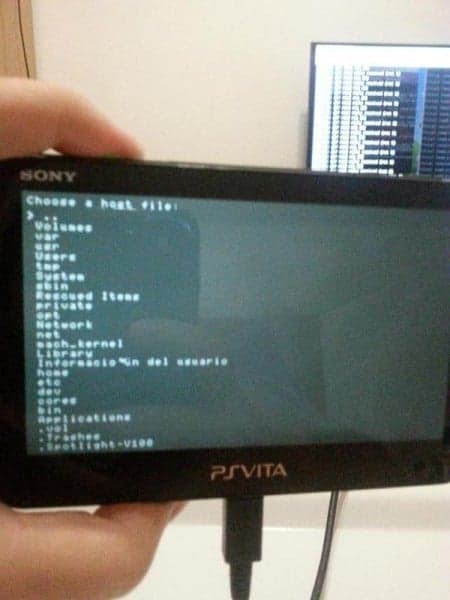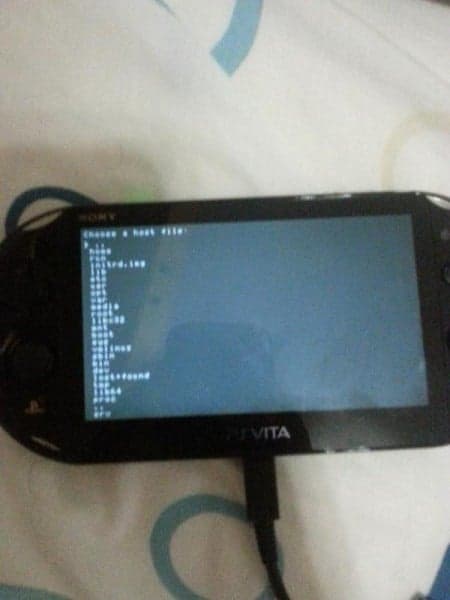Early this month, developer psxdev was working on getting PSP2link & PSP2client working for the PSVita as seen in the tweet below.
https://twitter.com/psxdev/status/628623076385771520
Well today, psxdev has finished this projects and has put them up on GitHub for everyone to enjoy. So what’s next for psp2link here is what he had to say about it.
Well, this library can be extended adding differents commands like ps2link was defined. It could be incorporated inside uvloader code and it would let load elf from hosts and provide host io fuctionality to homebrew apps. I am not going to do a loader when we have already uvloader backend. If it is not incorporated inside uvloader you can use like library showed in sample.
About logging i like more udp log system like libdebugnet instead logging system incorporated in uvloader, but it is only my preference based only in my own experience since ps2dev days.
If you don’t want to use logging, initialize psp2link with right loglevel check libdebugnet sources to see differents log levels availables.
Here is a description of what PSP2Link & PSP2Client are and how to use them.
So what does PSP2Link do?
psp2link is a library for PSP2 to communicate and use host file system with psp2client host tool. It is the same method that we used in ps2dev days, so basically it is the same protocol than ps2link and ps2client have been using since 2003.
Functions availables are defined like native sceIoxx functions so it is easy for homebrew developer to use these new functions:
int psp2LinkIoOpen(const char *file, int flags, SceMode mode);
int psp2LinkIoClose(SceUID fd);
int psp2LinkIoRead(SceUID fd, void *data, SceSize size);
int psp2LinkIoWrite(SceUID fd, const void *data, SceSize size);
int psp2LinkIoLseek(SceUID fd, int offset, int whence);
int psp2LinkIoRemove(const char *file);
int psp2LinkIoMkdir(const char *dirname, SceMode mode);
int psp2LinkIoRmdir(const char *dirname);
int psp2LinkIoDopen(const char *dirname);
int psp2LinkIoDread(SceUID fd, SceIoDirent *dir);
int psp2LinkIoDclose(SceUID fd);
How do I use it?
1) Compile and install library and include file
You need a psp2 toolchain installed in your environment , libdebugnet and libvita2d installed and PSP2SDK must be defined. You will need psp2client linux/mac side tool installed on your system.
cd libpsp2link
make
make install
2) Compile sample
cd sample
edit main.c and change your mac/linux server ip and your base directory for example host0:/usr/local
make
3) Run sample with rejuvenete on vita and when you see psp2link splash screen you are ready to run psp2client in your mac/linux
psp2client -h ipofyourvita listen
You will see logs in terminal window output from your PlayStation Vita using libdebugnet udp log feauture and you can browse over folder in your hard disk.
Sample is showing only browser example you have full io r/w access to your hard disk
./psp2client -h yourvitaip listen
[INFO]: Client connected from xxx.xxx.xxx.xxx port: 30915
[INFO]: sock psp2link_fileio set 50 connected 1
[INFO]: Waiting for connection
[INFO]: psp2link connected 1
[DEBUG]: dir open req (host0:/usr/local)
aqui
[DEBUG]: dir open reply received (ret 0)
[DEBUG]: dir read req (0)
[DEBUG]: dir read reply received (ret 1)
[DEBUG]: dir read req (0)
[DEBUG]: dir read reply received (ret 1)
[DEBUG]: dir read req (0)
[DEBUG]: dir read reply received (ret 1)
[DEBUG]: dir read req (0)
[DEBUG]: dir read reply received (ret 1)
[DEBUG]: dir read req (0)
[DEBUG]: dir read reply received (ret 1)
[DEBUG]: dir read req (0)
[DEBUG]: dir read reply received (ret 1)
[DEBUG]: dir read req (0)
[DEBUG]: dir read reply received (ret 1)
[DEBUG]: dir read req (0)
[DEBUG]: dir read reply received (ret 1)
[DEBUG]: dir read req (0)
[DEBUG]: dir read reply received (ret 1)
[DEBUG]: dir read req (0)
[DEBUG]: dir read reply received (ret 1)
[DEBUG]: dir read req (0)
[DEBUG]: dir read reply received (ret 1)
[DEBUG]: dir read req (0)
[DEBUG]: dir read reply received (ret 1)
[DEBUG]: dir read req (0)
[DEBUG]: dir read reply received (ret 1)
[DEBUG]: dir read req (0)
[DEBUG]: dir read reply received (ret 1)
[DEBUG]: dir read req (0)
[DEBUG]: dir read reply received (ret 1)
[DEBUG]: dir read req (0)
[DEBUG]: dir read reply received (ret 1)
[DEBUG]: dir read req (0)
[DEBUG]: dir read reply received (ret 1)
[DEBUG]: dir read req (0)
[DEBUG]: dir read reply received (ret 1)
[DEBUG]: dir read req (0)
[DEBUG]: dir read reply received (ret 1)
[DEBUG]: dir read req (0)
[DEBUG]: dir read reply received (ret 0)
[DEBUG]: psp2link_file: dir close req (fd: 0)
[DEBUG]: dir close reply received (ret 0)
5) ready to have a lot of fun
Download: PSP2Link
On to psp2client for the Vita, now psxdev does not have anymore free time to add Windows support to psp2client so if any of want to help out with it you can contact him via GitHub or on twitter @psxdev.
PSP2CLIENT FOR PC/MAC
What does this do?
psp2client is a host tool providing host fileio system for PSP2. It is the same method that we used in ps2dev days, so basically it is the same protocol than ps2link and ps2client have been using since 2003.
It provide all io request operation availables on psp2link library. Now command are not implemented but it can be easily incorporated.
By now only osx and linux confirmed to run fine.
How do I use it?
1) Compile and install psp2client
You need a gcc installed in your environment
make
make install
2) Run sample provided in psp2link with rejuvenete on vita and when you see psp2link splash screen you are ready to run psp2client in your mac/linux
psp2client -h ipofyourvita listen
You will see logs in terminal window output from your PlayStation Vita using libdebugnet udp log feauture and you can browse over folder in your hard disk.
Sample is showing only browser example you have full io r/w access to your hard disk
./psp2client -h yourvitaip listen
[INFO]: Client connected from xxx.xxx.xxx.xxx port: 30915
[INFO]: sock psp2link_fileio set 50 connected 1
[INFO]: Waiting for connection
[INFO]: psp2link connected 1
[DEBUG]: dir open req (host0:/usr/local)
aqui
[DEBUG]: dir open reply received (ret 0)
[DEBUG]: dir read req (0)
[DEBUG]: dir read reply received (ret 1)
[DEBUG]: dir read req (0)
[DEBUG]: dir read reply received (ret 1)
[DEBUG]: dir read req (0)
[DEBUG]: dir read reply received (ret 1)
[DEBUG]: dir read req (0)
[DEBUG]: dir read reply received (ret 1)
[DEBUG]: dir read req (0)
[DEBUG]: dir read reply received (ret 1)
[DEBUG]: dir read req (0)
[DEBUG]: dir read reply received (ret 1)
[DEBUG]: dir read req (0)
[DEBUG]: dir read reply received (ret 1)
[DEBUG]: dir read req (0)
[DEBUG]: dir read reply received (ret 1)
[DEBUG]: dir read req (0)
[DEBUG]: dir read reply received (ret 1)
[DEBUG]: dir read req (0)
[DEBUG]: dir read reply received (ret 1)
[DEBUG]: dir read req (0)
[DEBUG]: dir read reply received (ret 1)
[DEBUG]: dir read req (0)
[DEBUG]: dir read reply received (ret 1)
[DEBUG]: dir read req (0)
[DEBUG]: dir read reply received (ret 1)
[DEBUG]: dir read req (0)
[DEBUG]: dir read reply received (ret 1)
[DEBUG]: dir read req (0)
[DEBUG]: dir read reply received (ret 1)
[DEBUG]: dir read req (0)
[DEBUG]: dir read reply received (ret 1)
[DEBUG]: dir read req (0)
[DEBUG]: dir read reply received (ret 1)
[DEBUG]: dir read req (0)
[DEBUG]: dir read reply received (ret 1)
[DEBUG]: dir read req (0)
[DEBUG]: dir read reply received (ret 1)
[DEBUG]: dir read req (0)
[DEBUG]: dir read reply received (ret 0)
[DEBUG]: psp2link_file: dir close req (fd: 0)
[DEBUG]: dir close reply received (ret 0)
3) ready to have a lot of fun



